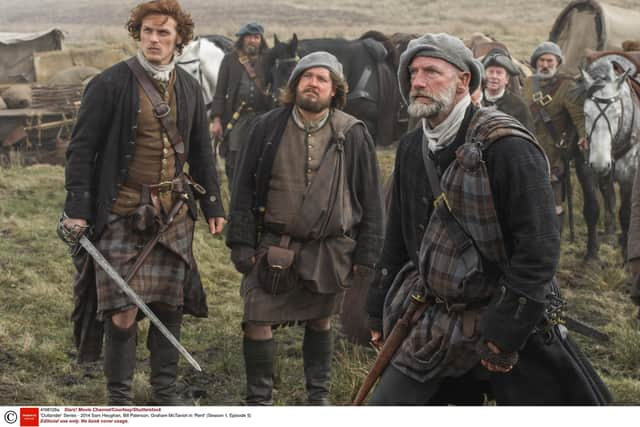Exclusive:Outlander: Scotland's living heritage needs protection from film and tv 'misrepresentation'
Legal safeguards are needed to protect Scotland’s ‘living heritage’ from being misrepresented by film and television, it has been claimed.
It comes as the the UK moves towards ratifying a 2003 UNESCO convention on the protection of intangible cultural heritage with Hogmanay, kilt wearing, waulking songs and peat cutting among likely contenders for Scotland's offering to a global ‘repository’ of traditions and ways that define us and bind us.
Advertisement
Hide AdAdvertisement
Hide AdDr Stephen Collins, of University of West of Scotland, welcomed the move but said “serious discussion” was required to get full legal protection for living heritage, which was often used as a backdrop in films and TV shows without proper attribution or financial support to communities where traditions originate.


Dr Collins pointed to the huge success of television series Outlander, partly set in the 18th Century Highlands, and the need to have proper accountability for the depictions of living heritage in such productions.
Countries including Ghana and Nigeria protect the use of intangible cultural heritage in copyright law with fees paid to either the state or direct to communities for its use, he added.
Dr Collins said: “There are two important issues that we hope the implementation of the 2003 Convention will address: firstly, preservation and the handing down of intangible cultural heritage from one generation to the next. This issue is particularly acute in areas of Scotland where languages such as Gaelic are disappearing, meaning that the heritage could disappear with them.
“Secondly, exploitation, where intangible cultural heritage is used as the backdrop to films and TV shows without attribution or any money flowing back to the communities to support safeguarding activities. Without a framework for regulation, the worst-case scenario here is that the intangible heritage is used in such a way that allows for misrepresentation or misinterpretation because currently there is no way to challenge that use.”
In Outlander, criticisms have been made about the wrong Fraser tartan being worn by its lead character. In Skyfall, Scotland was depicted simply as “a long drive from London and ends up looking like a Baronial house with tartan carpets and single malt”, Dr Collins said.
Dr Collins recently undertook research with Dr Ben Thomas of Historic Environment Scotland into living heritage in Lewis and Harris, which was funded by the British Academy.
Meanwhile, the Department for Culture Media and Sport has consulted on what should be included in a UK-wide list of living heritage ahead of the UNESCO bid.
Advertisement
Hide AdAdvertisement
Hide AdDr Collins said: "Signing up to the soft law convention is great in terms of awareness raising of intangible cultural heritage but it doesn’t cover who owns it and who has the right to say no to its use.
"If an HBO comes and makes an Outlander and there is money raised on that because it is a multi-million pound venture, where does that money flow back to?
"Does any of that money come back to the originating community who are the knowledge bearers of the things we are seeing on screen that could then support local education, and local preservation?
“Does the local community in any way have a right to say ‘no’, this is misrepresenting us. This is not our history, not our story?”